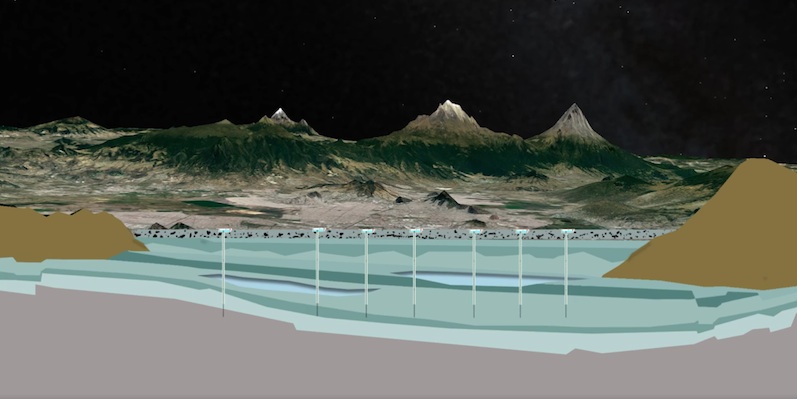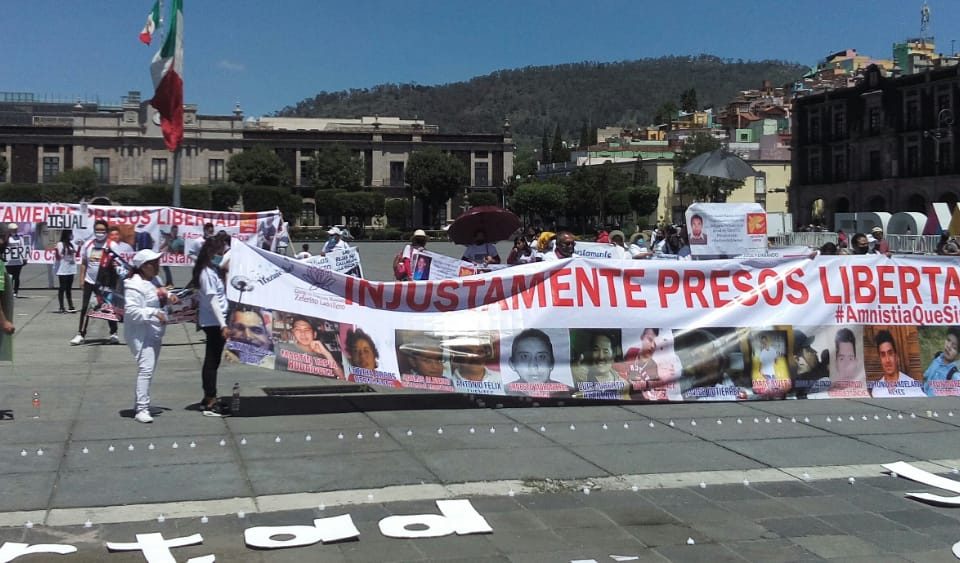
Permissions are denied for “Michelada Fest” on Ecatepec
May 13, 2019
IEEM updates public servants on transparency issues
May 13, 2019In 40 years, the aquifer that supplies the Valley of Mexico could be dried up

HIGHLIGHTS
In 40 years, the aquifer that supplies the Valley of Mexico could be dried up

May 13th, 2019
The use of water in the Valley of Mexico is an example of non-sustainability. "We have made calculations and stated that probably in 40 years we will have depleted the technical capacity to extract that resource from our aquifer", said the technical coordinator of the Water Network of the UNAM, Fernando González Villarreal.
Moreover, it seems like 40 years is a lot of time, but it is actually a brief period for the city and the country, said the also researcher of Engineering Institute (II) during the “Frontier topics in sustainability” international seminar, which was organized by the University Coordination for Sustainability (COUS), focused this month on water. González Villarreal said that the objective of the seminar is to disseminate cutting-edge research linked to sustainability, to establish links with the international environment, to learn from the best practices in other countries and to provide with the Mexican experiences.
"The problems of water and sustainability are interdisciplinary," he said during the inauguration of the seminar. He also pointed out that the reflections will be used for the new Regional Center for Water Security, constituted by the Institute of Engineering (II) and the Mexican Institute of Water Technology, sponsored by UNESCO. Manuel Perló Cohen, from the Social Research Institute, indicated that we have a serious problem in the governance of this resource, which can be understood as the lack of capacity to solve conflicts.
Mexico is currently in a standstill in the expansion of water and sewage services. There is distrust among the people involved in the issue and the current legislation is not an instrument that helps to solve the problems. However, he considered that the proposal to create a new National Water Law opens the possibility of moving towards new governance: creating agreements, negotiations, and schemes.
María del Carmen Carmona Lara, from the Institute of Legal Research, argued that sustainable development cannot be achieved without water security, and for this, an authority on the water issue who governs well is required and that their actions are legally founded and motivated.
It is also necessary to have accurate information for decision making because in the current legal framework aquifers do not agree with the states or municipalities, or the basins with the aquifers. Meanwhile, Rafael Val Segura, director of the Citizen Agreement of the Water System of Mexico City (SACME), explained that there has been given any importance to water culture in the Valley of Mexico. This is not a valued resource in an environmental, economic or social manner. "We do not give it the economic value because it's free," he said. Currently, five states are supplied from this basin and it is necessary to define how the resource should be distributed and who should mainly use it: agriculture, industry or the population.
"Education and culture are fundamental pieces to change attitudes, transform values, beliefs and behaviors. We have to work on the culture of water so that the population can help us to be a better system and have water security, we need challenges in the governance of water in the face of water security ", he said. María Luisa Torregrosa and Armentia, from the Latin American Faculty of Social Sciences, pointed out that in the last three decades there have been 1, 542 conflicts over water in the country. At first, they were infrastructure demands, but now they are related to its management. In addition, these conflicts have been radicalized, from complaints to the taking of facilities, stoppages and authorities kidnapping. Organizations that deal with this problem are linked to global struggles such as the human right to water and equitable distribution.
Prior to the discussion table, Sharon B. Megdal, director of the Center for Research on Water Resources of the University of Arizona, gave the conference "Challenges and opportunities towards a new paradigm of water governance", to which the director of the II, Luis Álvarez Icaza, and the holder of the COUS, María del Coro Arizmendi, attended. She explained that governance is more complex than who governs, and what the legal framework to do it was. Evaluations of transboundary waters have been conducted between Mexico and the United States. An example is the Binational Study on the Transboundary Aquifer of the San Pedro River, which required inclusion, consultation, and communication between both nations.
Staff
Translator: Martín Caballero
The use of water in the Valley of Mexico is an example of non-sustainability. "We have made calculations and stated that probably in 40 years we will have depleted the technical capacity to extract that resource from our aquifer", said the technical coordinator of the Water Network of the UNAM, Fernando González Villarreal.
Moreover, it seems like 40 years is a lot of time, but it is actually a brief period for the city and the country, said the also researcher of Engineering Institute (II) during the “Frontier topics in sustainability” international seminar, which was organized by the University Coordination for Sustainability (COUS), focused this month on water. González Villarreal said that the objective of the seminar is to disseminate cutting-edge research linked to sustainability, to establish links with the international environment, to learn from the best practices in other countries and to provide with the Mexican experiences.
"The problems of water and sustainability are interdisciplinary," he said during the inauguration of the seminar. He also pointed out that the reflections will be used for the new Regional Center for Water Security, constituted by the Institute of Engineering (II) and the Mexican Institute of Water Technology, sponsored by UNESCO. Manuel Perló Cohen, from the Social Research Institute, indicated that we have a serious problem in the governance of this resource, which can be understood as the lack of capacity to solve conflicts.
Mexico is currently in a standstill in the expansion of water and sewage services. There is distrust among the people involved in the issue and the current legislation is not an instrument that helps to solve the problems. However, he considered that the proposal to create a new National Water Law opens the possibility of moving towards new governance: creating agreements, negotiations, and schemes.
María del Carmen Carmona Lara, from the Institute of Legal Research, argued that sustainable development cannot be achieved without water security, and for this, an authority on the water issue who governs well is required and that their actions are legally founded and motivated.
It is also necessary to have accurate information for decision making because in the current legal framework aquifers do not agree with the states or municipalities, or the basins with the aquifers. Meanwhile, Rafael Val Segura, director of the Citizen Agreement of the Water System of Mexico City (SACME), explained that there has been given any importance to water culture in the Valley of Mexico. This is not a valued resource in an environmental, economic or social manner. "We do not give it the economic value because it's free," he said. Currently, five states are supplied from this basin and it is necessary to define how the resource should be distributed and who should mainly use it: agriculture, industry or the population.
"Education and culture are fundamental pieces to change attitudes, transform values, beliefs and behaviors. We have to work on the culture of water so that the population can help us to be a better system and have water security, we need challenges in the governance of water in the face of water security ", he said. María Luisa Torregrosa and Armentia, from the Latin American Faculty of Social Sciences, pointed out that in the last three decades there have been 1, 542 conflicts over water in the country. At first, they were infrastructure demands, but now they are related to its management. In addition, these conflicts have been radicalized, from complaints to the taking of facilities, stoppages and authorities kidnapping. Organizations that deal with this problem are linked to global struggles such as the human right to water and equitable distribution.
Prior to the discussion table, Sharon B. Megdal, director of the Center for Research on Water Resources of the University of Arizona, gave the conference "Challenges and opportunities towards a new paradigm of water governance", to which the director of the II, Luis Álvarez Icaza, and the holder of the COUS, María del Coro Arizmendi, attended. She explained that governance is more complex than who governs, and what the legal framework to do it was. Evaluations of transboundary waters have been conducted between Mexico and the United States. An example is the Binational Study on the Transboundary Aquifer of the San Pedro River, which required inclusion, consultation, and communication between both nations.
Staff
Translator: Martín Caballero





